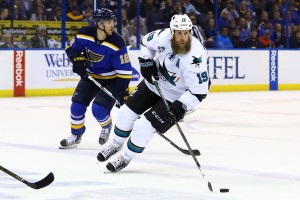When Nail Yakupov (now a member of the St. Louis Blues) returned to Edmonton for the first time since being traded, he scored a goal, albeit in a losing cause. But the game brought Yakupov back into the spotlight. He was the first overall draft pick in 2012, though he has yet to really live up to that distinction. The Oilers traded him away for an underwhelming return. He still has a chance to prove that he deserved to be chosen at number one, it just won’t be as a member of the team that drafted him.
Are First Overall Picks Always Elite?

Every few years you’ll get your generational talents, like Sidney Crosby, Connor McDavid and Alex Ovechkin. You’ll get your superstars like Steven Stamkos, Patrick Kane and Aaron Ekblad. But mixed in there you’ll get the guys who were victims of poor draft classes, or guys who were projected to be great but simply didn’t live up to the lofty expectations. There are plenty of “can’t miss” prospects, but just as many question marks. And someone has to go first every year. Many times, the title of first overall pick automatically makes a player untradable in the eyes of some, regardless of how good they actually are or if they fit in with their team.
Everyone can be traded. (Whether they should be is a different story). There are plenty of general managers who aren’t intimidated by that first overall status, Peter Chiarelli being one of them. Not only did he deal Yakupov, but he also traded away 2010 number one pick Taylor Hall. Chiarelli wasn’t the first and won’t be the last to do so. The jury is still out on those two deals. But how did similar trades work out in the past?
Erik Johnson — 2006 (St. Louis Blues)
The 2006 draft is one that a few teams would probably like a do-over on. There’s a reason why defencemen rarely get picked first, and that’s because you’re banking on their game adjusting seamlessly to the NHL, and it doesn’t always work out that way. There are very few Ekblad’s out there and a whole lot of Erik Johnson’s. The Minnesota native was projected to be the prototypical top pairing guy. He skated well, he moved the puck, he was offensively minded and he had size. Now it’s not that he wasn’t all those things, but when Jonathan Toews was sitting right behind him on draft day, the selection had many puzzled.
The Blues gave Johnson every chance to succeed, but he ran into some injury trouble and didn’t produce at the rate they expected him to. They elected to trade him to the Colorado Avalanche in 2011. The deal was Johnson, Jay McClement, and a first round pick for Kevin Shattenkirk, Chris Stewart, and a second-round pick. The deal worked out for both sides, and you could argue it was better for the Blues because they’ve had more postseason success. Every team wants and needs that number one defenceman, and the Blues eventually got him in Alex Pietrangelo. They took a flyer on Johnson, and it translated into a decent trade for them.
Rick Nash — 2002 (Columbus Blue Jackets)

Nash didn’t want to be in Columbus anymore, so the team honored his wishes and dealt him to the New York Rangers. They didn’t really have a choice so they got what they could. The full trade was Nash, Steven Delisle and a conditional third-round draft pick for Brandon Dubinsky, Artem Anisimov, Tim Erixon and a first round pick. The Rangers have since made it to the Stanley Cup Final, but in a losing cause, and Nash has been a notorious underachiever in the postseason.
The Blue Jackets are putting together a nice core (and will hopefully get a good coach eventually), while the Rangers always seem to be on the cusp of their Stanley Cup window closing. You could argue that the Blue Jackets ended up with the better of the deal, because Dubinsky is a key player for them, and Nash’s name consistently comes up in trade rumors. The true test of who won the trade would be measured in championships, which neither team has. But Nash was a good regular season performer in helping to get the Rangers to the playoffs, so you could call it an even deal.
Ilya Kovalchuk — 2001 (Atlanta Thrashers)
The Thrashers no longer exist (now the Winnipeg Jets), so it’s hard to say that any of their decisions were good ones. But Ilya Kovalchuk was the most talented player in his draft year. In 2010, the Thrashers consummated a deal with the Devils, sending Kovalchuk and Anssi Salmela to New Jersey for Nicklas Bergfors, Johnny Oduya, Patrice Cormier and a first-round pick. Kovalchuk was a pending free agent not likely to re-sign in Atlanta, so the Thrashers did well on getting something for him.
On the other end, the Devils ended up signing Kovalchuk to a long-term deal, one that caused them a lot of headaches and resulted in one Stanley Cup Final appearance. Kovalchuk has since bolted for the Kontinental Hockey League. The deal probably wasn’t really a win for either side, but not franchise-altering either. The Jets now have a lot of young talent to work with, while the Devils are slowly putting things together as well. (They happen to be the team that acquired former first overall pick Taylor Hall from the Oilers).
Joe Thornton — 1997 (Boston Bruins)

One of the most talked about trades of the decade was that of Joe Thornton to the San Jose Sharks in 2005. Despite recently signing a new deal with the Bruins, Thornton didn’t get along with the coaching staff, and the team elected to move him. It was a stunning deal, both for the player and the hockey world. Thornton was one of the best forwards in the league at the time. He was certainly the best player available in his draft year, and a fan favorite in Boston. The Sharks gave up Marco Sturm, Wayne Primeau, and Brad Stuart.
The old adage goes that unless you get the best player in the trade, you lose the trade. Thornton was clearly the best player in the deal, leading many to believe that the Sharks got the better end of the stick. And they have been a perennial playoff contender, though not yet achieving their goal of winning the Stanley Cup. Thornton is one of the best passers in the league, but his postseason performance has always been in question. As for the Bruins, well they’ve won the Cup since then.
Complete Oilers Coverage From THW
Did the Oilers Win The Trades?
Recent deals involving first overall picks weren’t exactly landslides on either end. In fact, when looking at Peter Chiarelli’s track record, you could argue that his trade of second overall pick Tyler Seguin to the Dallas Stars was the most lopsided of the bunch. For now, it’s way too soon to judge either the Yakupov or Hall deals. Even looking back after years have passed with the other first overall trades, it’s not always clear cut who “won” the transaction. And that’s often the case with trades, it ends up being a wash.
The Oilers made the moves they felt would make the team better now and in the future. Whether they were the right decisions, that’s still to be determined. The team is winning games right now, and that’s all that matters. Yakupov may end up being a star. He may end up as a depth player and nothing more. Hall is already established as one of the better goal scorers in the league. He just wasn’t the guy they wanted. He’ll be making his return to Edmonton on January 12, no doubt a date circled on everyone’s calendars.